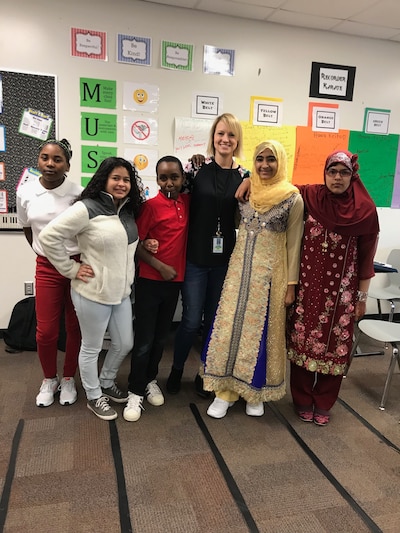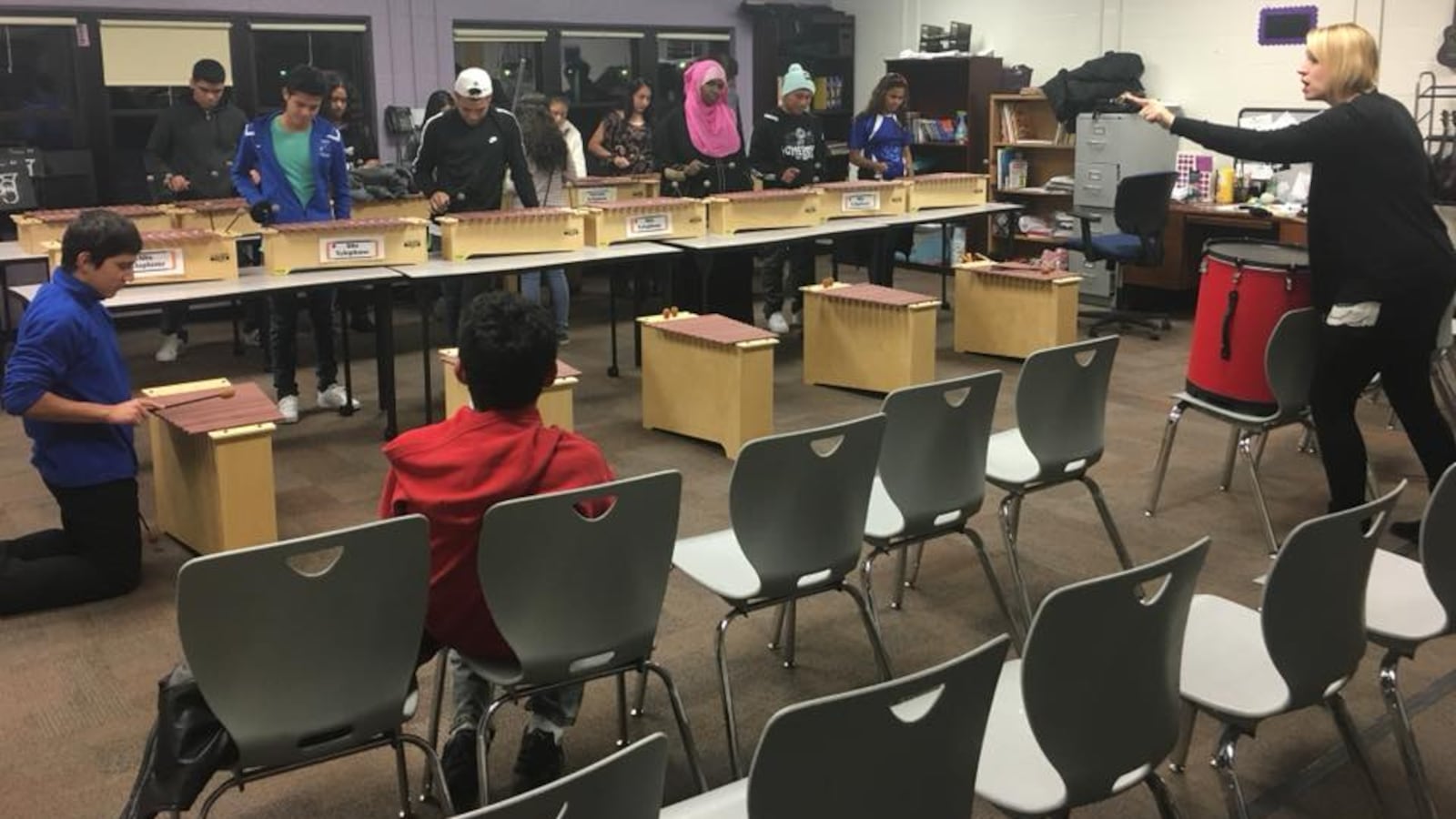Here, in a feature we call How I Teach, we ask educators who’ve been recognized for their work how they approach their jobs. You can see other pieces in the series here.
Music is the first language spoken in Kristin Gladish’s classroom.
No translations. No barriers. Just the sound of drums, recorders, and ukuleles fill Gladish’s music class in the Indianapolis Public Schools Newcomer Program.
“The burdens the students carry can be heavy, and many suffer from trauma, so one thing I try to do in music class is to provide a fun, caring environment,” Gladish said. “A place where troubles can be forgotten and even healed.”
The Newcomer Program is designed to help students who are new to the United States acclimate and learn English before transitioning to another school in the district. For Gladish, it’s about introducing students to an unfamiliar place through the power of music.
She tries to do this by finding music that students can relate to and understand, as well as encouraging them to build relationships and trust in the music room.
Gladish was one of 10 finalists for the district’s 2019 Teacher of the Year. Now, she’s sharing the story behind what drives her to be a mentor for immigrant students.
This interview has been condensed and lightly edited.
How do you get to know your students?

I get to know my students through chit-chat in the hallways, at my doorway, and through relationships built in the classroom during lessons. Since Newcomer Program is designed to teach our English as a Second Language students as much English as possible, I will often start class through a question for students to answer in English. We talk about everything from their weekend plans, high school futures, to the lessons and music we are working on in class. Students often visit me in between classes and at lunch, and that is another opportunity for relationship building.
Honestly, this part of teaching doesn’t come naturally for me, as I can tend to become hyper-focused on my lesson content. However, after focusing on getting to know students on a more personal level and also opening up and sharing more about myself, I find students are more likely to work hard, try new things, and there are less behavior problems in class. I now make the conscious effort to get to know each student, to notice things they like or are good at, and to learn something interesting about them. For the new students who don’t yet speak much English, this can take time, but I just keep talking to them until they eventually start to answer, which is pretty cool.
Tell us about a favorite lesson to teach. Where did the idea come from?
My favorite lesson to teach is modern band, hands down, which is funny since I started out my teaching career as a choir director. Last fall, I went to a training hosted by Little Kids Rock, a non-profit organization, to learn how to integrate teaching modern music into my music lessons. This experience changed the way I teach, and we also received instruments for our school.
To implement our modern band unit, our lessons revolved around small group centers and whole class instruction to learn how to play basic chords and rhythms on each instrument, including ukulele, guitar, electric guitar, bass guitar, keyboard, and drums.
As the final part of this unit, we worked on current popular songs like “Can’t Stop the Feeling,” “I Gotta Feeling,” and “Havana” as an ensemble with students on each instrument, based on their preference as well as aptitude.
I loved seeing students so engaged, and I saw students’ self confidence blossom as new talents were discovered. It was also just plain fun to play, sing, and jam together. I had a small group practice with me during their lunchtime, and other students would crowd around the doorway and inside my room just to listen and applaud. I loved seeing my students so proud of themselves and love teaching modern band.
What object would you be helpless without during the school day?
First comes my coffee, but then I’d have to say teaching without my microphone would make me feel the most helpless. We are making music every day, and an entire class of students playing drums, recorders, or ukuleles is loud. My voice and vocal health is so important to me, and without my microphone I would struggle. I also play the ukulele or whatever instrument we are working on along with my students, and without my instrument to demonstrate and model, especially with the language barrier in my classes, my job would be much more difficult.
What’s something happening in the community that affects what goes on inside your class?
The current situation with immigration and changing immigration laws absolutely affects students at the Newcomer Program. We have had students and/or their parents deported, while others are waiting on deportation hearings or going through the process of citizenship. We also are home to many refugees who are resettled here in Indianapolis. All of our students are starting new lives here in our community and many arrive without many material possessions.
The Newcomer Program is pretty amazing, though, in that we have a social worker and a parent involvement educator who help provide what the students and families need, both emotionally and physically, and even provide a school food bank.
The burdens the students carry can be heavy, and many suffer from trauma, so one thing I try to do in music class is to provide a fun, caring environment, and a place where troubles can be forgotten and even healed.
Tell us about a memorable time — good or bad — when contact with a student’s family changed your perspective or approach.
We have something in IPS called PIT Day, which is Parent in Touch Day. This is a day where all parents or guardians are invited to the school, along with the student for a student-led conference. I remember meeting with one parent and a particular high school student, who was one of the few students I taught who refused to participate in music. In this meeting, his mother shared with me some of the difficulties he had gone through and some personal family struggles, which opened my eyes to his issues. She also shared her concern for his future and for his overall mental well-being.
I realized that music class was the least of our worries. It can be easy to focus on what is going wrong in the classroom and to forget that there is often another story completely unrelated to school that is playing a role in student behavior.
After that meeting, I made an extra effort with this student and also let him have his space when he needed it, which was often. Through time, with help from a grief group at school, and with a lot of patience from his teachers, he did adjust to school and even to my class. He actually became one of my biggest helpers and even learned some guitar chords.
On the last day of school, he told me he was sorry and gave me the biggest bear hug. That is a hug I won’t ever forget.
What part of your job is most difficult?
This past year, the hardest thing was saying goodbye to my students at the end of the year! At the IPS Newcomer Program, students are in our program for one year before transitioning to their neighborhood or choice school. After creating such a strong bond with students and such a safe space, it was truly heartbreaking to say goodbye and to send them off. It was a day full of tears, hugs, special notes, and it was much harder than I thought it would be on both the students and the teachers. I hope to keep in touch with my students and to see them achieving success in their new schools.
What was your biggest misconception that you initially brought to teaching?
When I first started teaching choir, I was a somewhat high-brow, classically trained musician, and I expected all students to respond to and and to like every piece of music I wanted them to learn. I quickly learned that wasn’t going to happen. I realized I needed to meet students halfway, and find music they could relate to and understand, and build relationships and trust in the choir room before presenting music so far out of their comfort zone. I also started integrating more fun songs and activities in between the more difficult pieces or concepts to keep class engaging and lively. I now try to integrate many types and genres of music into my lessons to reach students who have varied interests. This is especially important now that I teach at a school with students from so many different countries and cultures. This past year I taught everything from African Drumming to Beethoven to Drake.
What are you reading for enjoyment?
I hope to read more for enjoyment this summer as I tend to consistently read teaching pedagogy books. I currently am reading “Enrique’s Journey,” which is the story of a young boy on his journey to the United States from Honduras to reunite with his mother. My principal purchased a set of these books for our school so we could better understand our students, and it’s been on my list to finish.
What’s the best advice you’ve received about teaching?
The best advice I’ve received about teaching is to practice self-care. The burdens of teaching can be great, but if we take care of ourselves, spend time with our families and friends and on our own hobbies, our cup will be full to be able to keep giving to students. I know when I am feeling happy and content, that spills over into the classroom and I have more patience with the students who need it the most.


